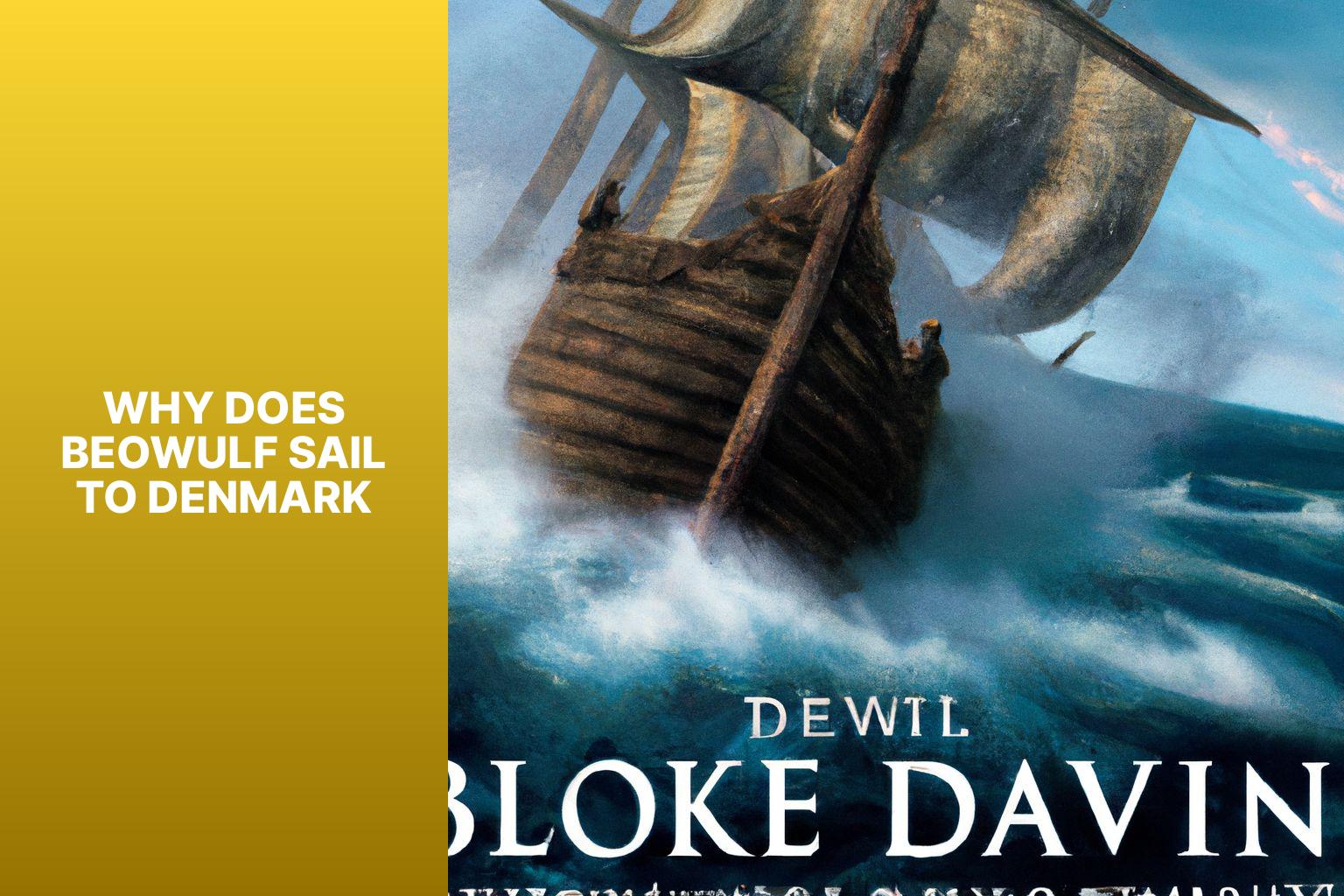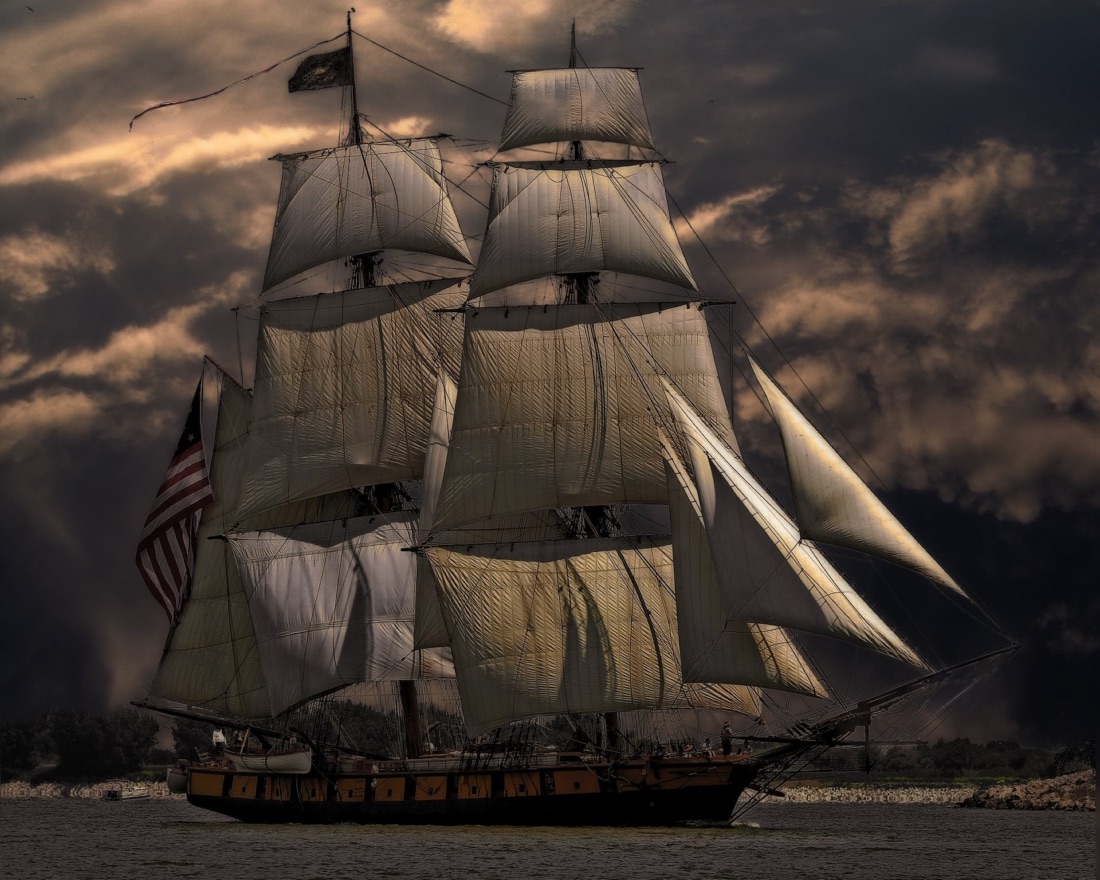Beowulf, one of the most celebrated epic poems in English literature, tells the legendary tale of a heroic warrior and his incredible adventures. Within the narrative, Beowulf embarks on a voyage to Denmark, which serves as a pivotal moment in the story’s progression. Understanding the motives behind Beowulf’s decision to sail to Denmark, the purpose of his journey, and the challenges he faces along the way is essential to comprehending the significance of this particular episode in the epic.
The story of Beowulf revolves around themes of heroism, bravery, and the eternal struggle between good and evil. The main character, Beowulf, is a Geat warrior who sets out on a quest to aid the Danish king, Hrothgar, in his battle against a fearsome monster named Grendel.
Beowulf’s decision to sail to Denmark is motivated by his desire to prove his strength and valor, as well as his sense of duty as a warrior. He sees an opportunity to test his abilities and save the Danes from the terror inflicted by Grendel.
Beowulf is sent on this quest by his own king, Hygelac, who appreciates Beowulf’s prowess and believes in his ability to accomplish great feats. The honor bestowed upon Beowulf by his king further motivates him to embark on this dangerous journey.
In Denmark, Beowulf’s purpose is to rid the kingdom of Grendel’s menace and restore peace and security. The monster’s attacks have caused immense suffering, and Beowulf feels a responsibility to help those in need. His strength, courage, and skills make him the ideal candidate for this daunting task.
Throughout his voyage, Beowulf faces various challenges, including treacherous waters, mythical creatures of the deep, and the wrath of Grendel himself. With his incredible physical prowess, unwavering determination, and the aid of his loyal companions, Beowulf overcomes these obstacles and continues his quest.
The outcome of Beowulf’s journey in Denmark has profound implications for both the characters in the epic and the overall narrative structure. It sets the stage for unforgettable battles, tests Beowulf’s character and mettle, and establishes his reputation as a legendary hero.
Ultimately, Beowulf’s journey to Denmark teaches him valuable lessons about bravery, honor, and the true nature of heroism. His encounters with adversity and his unwavering resolve demonstrate the virtues of a true warrior and illuminate the qualities that define Beowulf as an emblematic figure of heroism in literature.
##
Key takeaway:
- Beowulf’s voyage to Denmark is motivated by a problem that needs to be solved.
- Beowulf is the right person for the task because of his skills and bravery.
- Throughout his journey, Beowulf faces various challenges and overcomes them, leading to a positive outcome.
Overview of the Story
The epic poem Beowulf, written in the 8th century, provides an overview of the story. It follows the adventures of a heroic warrior named Beowulf as he sets out to help King Hrothgar in Denmark. Beowulf’s purpose in his journey is to prove his bravery and protect the innocent from the monstrous creature Grendel.
Upon reaching Denmark, Beowulf is welcomed by King Hrothgar and his warriors. He offers his assistance in defeating Grendel, providing an overview of the story. It is a proposition that the king eagerly accepts. Beowulf engages in a fierce battle with Grendel and emerges victorious, tearing off the creature’s arm. This victory brings joy and relief to the kingdom, establishing Beowulf as a hero among the people.
The story does not end there. Grendel’s mother seeks revenge for her son’s death and attacks the kingdom. Beowulf showcases his bravery once again by diving into Grendel’s mother’s underwater lair and defeating her.
The story of Beowulf provides an overview of the story and highlights themes of courage, heroism, and honor. It serves as a reflection of the values and beliefs of its time. This epic poem has endured throughout history, continuing to be studied and appreciated for its compelling storytelling and historical significance.
What is Beowulf About?
Beowulf is an epic poem that revolves around the story of a heroic warrior who embarks on a journey to Denmark at a time filled with turmoil and danger.
The kingdoms in this narrative are in a constant state of warfare, constantly being threatened by monstrous creatures.
The main character, Beowulf, is driven by the desire for fame, glory, and the protection of the innocent.
In the land of Denmark, Beowulf faces a daunting adversary known as Grendel, a terrifying monster whose terrorization is widespread among the kingdom and its people.
Beowulf possesses exceptional strength, courage, and determination, making him the perfect candidate for this formidable task.
He engages in battles against both Grendel’s mother and a dragon, encountering numerous challenges along the way.
Through acts of bravery, a mastery of combat skills, and an unwavering self-belief, Beowulf successfully overcomes these trials.
His journey in Denmark concludes with the triumphant defeat of the monstrous creatures, ultimately restoring peace to the kingdom.
Throughout his experiences, Beowulf gains invaluable insights into honor, loyalty, and the fleeting nature of earthly glory.
The poem delves into themes of heroism, the influence of fate, and the lasting legacy of a remarkable warrior.
Who is the Main Character?
The main character in the epic poem Beowulf is Beowulf himself. He is a strong and courageous warrior from Geatland who helps the King of the Danes, Hrothgar, battle the monstrous creature, Grendel. Beowulf, who is the main character, is known for his incredible strength and bravery, making him the perfect hero to face dangerous adversaries. He is a skilled fighter and has a reputation for winning battles.
Beowulf’s character, who is the main character, is defined by his determination to protect others and loyal to his people. His heroic deeds and noble qualities make him respected among his comrades. Throughout the story, Beowulf, who is the main character, faces challenges and overcomes them with his physical strength and strategic thinking.
As the main character, Beowulf, who is the main character, symbolizes bravery and honor. He embodies the values of the society in which the story is set and is celebrated for his courage and heroism. His character development and actions, led by being the main character, drive the narrative forward and inspire others to follow his lead.
The Voyage to Denmark
Beowulf undertook The Voyage to Denmark in order to aid King Hrothgar in his battle against the fearsome monster Grendel. Accompanied by his loyal companions, this brave warrior embarked on a perilous journey, navigating treacherous waters and encountering numerous unknown dangers.
Upon their arrival in Denmark, Beowulf showcased his strength and bravery by triumphing over Grendel, bringing much-needed relief to the kingdom and solidifying his status as a legendary hero.
Here’s a pro-tip: When faced with a daunting task like The Voyage to Denmark, it is essential to assemble a trustworthy group of resolute and valiant individuals. By pooling their support and combined efforts, the chances of success are significantly enhanced. Remember, when confronted with formidable obstacles, teamwork is absolutely crucial.
What Motivates Beowulf to Sail to Denmark?
Beowulf sails to Denmark in response to a call for help. The kingdom is being attacked by Grendel, a fearsome monster who has plagued the land for years. Beowulf, known for his strength and bravery, feels a duty to aid those in need and confront this menacing creature. His motivations also include a desire for glory and recognition. Beowulf wants to prove himself as a hero and gain fame through his brave actions. By challenging and defeating Grendel, he hopes to establish a reputation as a powerful warrior and protector of the innocent.
Beowulf’s loyalty and friendship with King Hrothgar play a role in his decision to sail to Denmark. Beowulf has a bond with Hrothgar, who has previously helped Beowulf’s father. Beowulf’s loyalty to his king and admiration for his father’s benefactor compel him to offer his assistance in overcoming this great threat.
Pro-tip: When faced with challenges, motivation can be a powerful driving force. By finding a purpose that aligns with your values and goals, you can tap into inner strength and determination that will propel you forward.
Who Sends Beowulf on this Quest?
King Hrothgar, the ruler of Denmark, is the one who sends Beowulf on this important quest.
Beowulf’s Purpose in Denmark
Beowulf’s Purpose in Denmark was to help King Hrothgar and his people against the monster Grendel. Beowulf’s arrival brought hope to the Danes who had suffered from Grendel’s attacks. As a renowned warrior, Beowulf used his skills and courage to protect the kingdom.
Beowulf’s purpose in Denmark was to ensure the safety and well-being of the Danish people. He confronted Grendel to stop his reign of terror and restore peace and security to the kingdom.
Throughout history, legendary heroes like Beowulf have helped those in need. Heroes in various cultures and time periods have defended their people and fostered unity and resilience.
In medieval times, knights and warriors pledged loyalty to rulers or kingdoms, just like Beowulf did in Denmark. They served as guardians, defending their lands and people from threats. Protecting and serving was deeply ingrained in society and culture at that time.
Beowulf’s purpose in Denmark is a testament to the timeless concept of heroes stepping up when help is needed the most. Their selflessness and dedication inspire future generations.
What Problem Awaits Beowulf in Denmark?
In Denmark, Beowulf confronts the problem of Grendel, a vicious monster terrorizing the kingdom. Grendel’s attacks have caused great fear and devastation among the people of Denmark, killing King Hrothgar’s warriors and wreaking havoc on the mead hall, Heorot. This problem has persisted for years, and the kingdom desperately needs a solution to end Grendel’s reign of terror.
Beowulf, known for his strength and bravery, is the right person to confront this problem. He possesses exceptional skills as a warrior and has a reputation for his heroic deeds. Beowulf’s physical abilities and determination make him the ideal candidate to face the mighty Grendel.
The problem awaiting Beowulf in Denmark is not easy to overcome. Grendel is a formidable opponent with supernatural strength, making it challenging for anyone to defeat him. Beowulf is undeterred by this challenge and sets out to face Grendel head-on.
Using his strength and skill, Beowulf engages in a fierce battle with Grendel. In a display of his exceptional fighting abilities, Beowulf defeats the monster, tearing off his arm in the process. This victory brings relief and joy to the people of Denmark, as they are finally free from the menace of Grendel.
Beowulf’s triumph over Grendel demonstrates his remarkable abilities and courage. It also teaches him valuable lessons about the power of bravery and the importance of helping those in need. Beowulf’s journey to Denmark becomes a significant chapter in his heroic tale, showcasing his bravery and resilience in the face of adversity.
In the early 11th century, Denmark faced Viking invasions that threatened the kingdom’s stability. The Vikings, known for their raids and pillaging, were a significant problem for the Danish people. King Sweyn Forkbeard of Denmark took action to confront this issue. He built a powerful navy and military, developing strategies to defend against Viking attacks. Through his determination and leadership, King Sweyn successfully repelled the Viking invasions and brought stability to Denmark. His efforts ensured the safety and well-being of his people, leaving a lasting legacy in Danish history.
Why is Beowulf the Right Person for this Task?
Beowulf is the right person for this task because of his exceptional abilities and qualities. He possesses immense strength, as demonstrated by his previous heroic feats of defeating Grendel and his mother. This strength allows him to take on any physical challenges.
In addition to his physical prowess, Beowulf possesses remarkable courage and bravery. He fearlessly confronts dangerous monsters without hesitation.
Beowulf’s unwavering determination and loyalty make him the perfect candidate for the task. He is dedicated to fulfilling his duty and protecting others, even if it means putting himself in harm’s way.
Beowulf’s reputation as a respected and admired warrior also makes him the right person for this task. The people of Denmark have heard of his previous triumphs, which instills confidence in them.
Challenges Faced by Beowulf
Beowulf, the legendary hero, encountered numerous challenges during his journey. From the moment he arrived in Denmark, Beowulf confronted the monstrous creature Grendel, who had been terrorizing the land. Engaging in a fearsome battle, Beowulf emerged victorious, triumphing over Grendel and putting an end to his reign of terror. The challenges did not cease there.
Determined to ensure the safety of the Danish people, Beowulf bravely ventured into the depths of a treacherous underwater lair, where he confronted Grendel’s vengeful mother. In a grueling fight, Beowulf once again showed his strength and resilience, ultimately defeating the formidable foe and securing the peace of the land.
But the greatest challenge was yet to come. Beowulf faced a fire-breathing dragon, a fearsome creature that tested his courage and strength to the utmost. Despite sustaining fatal injuries, Beowulf fought valiantly and managed to slay the dragon, but at the cost of his own life.
These heroic deeds etched Beowulf’s name in the annals of literature. His unwavering determination in the face of insurmountable challenges solidified his legendary status, making him a symbol of bravery and honor. It is through Beowulf’s epic tale that we gain insight into the courage and resilience required to overcome the challenges life throws our way.
Fact: It is worth noting that Beowulf holds the distinction of being one of the oldest surviving epic poems in Old English.
What Obstacles Does Beowulf Encounter Along the Way?
Beowulf encounters various obstacles during his journey to Denmark. He faces treacherous sea conditions that pose a threat to his ship and the safety of his crew. The powerful waves and challenging weather put Beowulf’s leadership, strength, and resilience to the test. A sea monster known as a “nicor” attacks his vessel, further endangering the success of his mission. Beowulf depends on his bravery and exceptional combat skills to defeat the creature and safeguard his crew.
On land, Beowulf confronts the obstacle of Grendel, a mighty monster that instills terror in the kingdom of Herot. Grendel possesses extraordinary strength and is impervious to conventional weaponry. Beowulf’s physical prowess and unwavering determination are put to the ultimate test as he engages in a fierce battle with Grendel, ultimately dealing a fatal blow.
Beowulf must face the vengeance of Grendel’s mother. Seeking retribution for her son’s demise, she lures Beowulf into her underwater lair. In this treacherous domain, Beowulf navigates the hazardous depths and confronts a formidable adversary in a life-and-death struggle. Despite the daunting adversity, Beowulf emerges triumphant over Grendel’s mother, restoring peace to the kingdom.
It is crucial to remain resolute and leverage one’s unique strengths when confronted with obstacles. Beowulf’s unwavering courage and strategic thinking serve as valuable lessons in overcoming adversity.
How Does Beowulf Overcome these Challenges?
Beowulf, the legendary hero of the epic tale, demonstrates his prowess by conquering numerous challenges using his strength, bravery, and tactical skills. His formidable opponents, including Grendel, Grendel’s mother, and a fire-breathing dragon, are no match for Beowulf’s physical abilities. In gripping battles, he rips off Grendel’s arm and slays Grendel’s mother with a sword obtained from her own lair, showcasing his fearlessness and courage.
Beowulf’s triumphs are not solely attributed to his physical might. His strategic thinking and exceptional leadership qualities also play a significant role in his success. He devises and executes effective plans to vanquish his adversaries, adapting quickly to changing circumstances. A prime example of his astuteness is when he realizes his sword is ineffective against the dragon, prompting him to engage in hand-to-hand combat instead. This quick thinking and adaptability demonstrate his ingenuity.
Beowulf relies on the unwavering support of loyal warriors who stand by his side. These dedicated allies provide crucial assistance, serving as backup and fulfilling important tasks, ultimately contributing to the overall success of Beowulf’s missions.
Much like Beowulf, Aron Ralston, a brave mountaineer, confronts immense challenges during his expedition through a treacherous canyon. His most daunting trial occurs when his arm becomes trapped under a massive boulder, leaving him with limited options. Ralston’s unwavering determination, resourcefulness, and unwavering physical strength become vital in overcoming this life-threatening predicament. Exhibiting incredible resilience, Ralston courageously breaks and amputates his own arm to free himself. His remarkable survival story serves as a testament to the indomitable human spirit and the power of perseverance in the face of extreme adversity.
What is the Outcome of Beowulf’s Journey in Denmark?
After completing his journey to Denmark, Beowulf defeated the monster Grendel. Grendel had terrorized the Danes, causing death and destruction in Heorot, their great hall. With his strength and bravery, Beowulf confronted and battled Grendel. Despite Grendel’s power, Beowulf overpowered and mortally wounded the monster. Grendel fled back to his lair and died from his injuries. This victory brought relief and restored peace and safety to Heorot.
The outcome of Beowulf’s journey also included a new challenge from Grendel’s vengeful mother. Seeking revenge for her son’s death, she attacked Heorot, creating chaos and destruction. Once again, Beowulf displayed bravery by venturing into her underwater lair to confront her. He defeated Grendel’s mother, ending her reign of terror.
Through his heroic deeds in Denmark, Beowulf gained fame and honor, solidifying his reputation as a legendary hero. His journey demonstrated his exceptional warrior skills, determination, and commitment to protecting others. Beowulf’s triumph over the monsters showcased his strength and established his legacy as a hero.
What Lessons Does Beowulf Learn from this Experience?
Beowulf gains valuable insights from his time in Denmark. He acquires knowledge about the significance of humility, the power of collaboration, and the reliance on others. He grasps the importance of maintaining his honor, staying true to his word, and comprehends the profound impact his actions have on his reputation. Beowulf comprehends the fragile nature of life and the inevitability of death. Bearing witness to the demise of courageous warriors, including his own comrades, serves as a poignant reminder of how fleeting life is and the necessity to establish a lasting legacy.
Some Facts About Why Does Beowulf Sail To Denmark:
- ✅ Beowulf sails to Denmark to come to the aid of King Hrothgar and his people who are being attacked by the hideous monster Grendel. (Source: Microblife)
- ✅ Beowulf is a young warrior eager to earn glory and enhance his reputation, sailing to Denmark as part of his lifelong quest for honor. (Source: Our Team)
- ✅ Beowulf sails to Denmark to pay back the favors from Hrothgar and the Danes, as Hrothgar had once done a great favor for Beowulf’s father. (Source: Microblife)
- ✅ Grendel, the monster tormenting the Danes, lacks a moral center and is outraged by the orderliness of creation. (Source: Our Team)
- ✅ Beowulf travels from his home in Geatland to the land of the Danes to challenge and vanquish Grendel, who has been wreaking havoc and horror upon Hrothgar’s kingdom. (Source: Microblife)
Frequently Asked Questions
Why does Beowulf sail to Denmark?
Beowulf sails to Denmark in order to come to the aid of King Hrothgar and his people who are being attacked by the hideous monster Grendel. Beowulf is a young warrior eager to earn glory and enhance his reputation, and he sees this as an opportunity to increase his fame and prove his skills once again. Hrothgar had helped Beowulf’s father in the past, so Beowulf is also paying back the favors.
What is Beowulf’s motive for sailing to Denmark?
Beowulf’s motives for sailing to Denmark are complex. He is a young warrior aspiring to gain more fame and glory by defeating Grendel. He is on a lifelong quest of honor, believing that only through fame and honor can a warrior hope to gain a measure of immortality. Inspired by the challenge, Beowulf sails to Denmark with a small company of men determined to defeat Grendel.
Why does Beowulf choose to fight without weapons?
When Beowulf meets the Danes, he lays aside his weapons and removes his armor, stating his intention to fight Grendel unarmed. This demonstrates Beowulf’s exceptional strength and his adherence to the heroic code of honor. By choosing to fight without weapons, Beowulf shows his bravery and confidence in his own abilities.
How does Beowulf’s journey to Denmark enhance his identity?
Beowulf’s journey to Denmark enhances his identity as a good warrior and a champion of the Danish tribe. By coming to the aid of Hrothgar and his people, Beowulf showcases his loyalty and bravery. His success in battling Grendel and his mother also brings him praise and glory, which further establishes his identity as a renowned hero.
Why does Beowulf need to establish his identity as a hero?
For Beowulf, establishing his identity as a hero is crucial because it is through fame and honor that a warrior can hope to gain a measure of immortality. By performing heroic feats and being showered with praise, Beowulf solidifies his place in the memories and stories of the people, ensuring his name will be remembered for generations to come.
What is the main theme portrayed in Beowulf’s journey to Denmark?
The main theme portrayed in Beowulf’s journey to Denmark is the triumph of good over evil. Beowulf, with his super strength and unwavering bravery, takes on the monstrous Grendel and his mother, who have been terrorizing Hrothgar’s kingdom. Through his heroic deeds, Beowulf restores peace and justice to the land, embodying the values and virtues of a good king and a noble warrior.





Leave a Reply